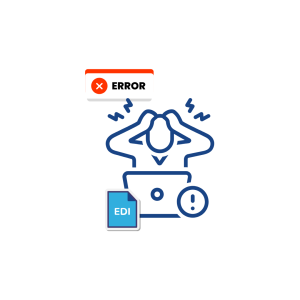Introduction to EDI in the Automobile Industry
The automotive industry is a complex and global network of suppliers, manufacturers, and logistics providers. To navigate this intricate web and achieve success, collaboration and communication are paramount. This is where Electronic Data Interchange (EDI) comes into play. EDI technology facilitates the electronic exchange of business documents and information between trading partners, enabling the automotive industry to optimize its supply chain and overcome the challenges it faces.
Key Takeaways
- EDI helps improve efficiency by ensuring real-time data flow and transparency across the supply chain. This leads to better coordination between suppliers and manufacturers, optimizing production and reducing lead times
- EDI also supports just-in-time (JIT) manufacturing, where precise timing and coordination of supplies are essential. By automating order and delivery processes, EDI ensures the timely arrival of parts and materials, avoiding production delays.
- Moreover, EDI enhances compliance with industry standards and regulations by ensuring accurate and consistent documentation. This is critical in the highly regulated automotive industry, where maintaining quality and meeting strict deadlines are paramount.
- Commport’s EDI solutions help automotive businesses integrate their supply chains, ensuring smoother operations, increased efficiency, and compliance with industry standards, ultimately improving overall performance.
Understanding EDI in the Automotive Industry
In the automotive industry, EDI, or Electronic Data Interchange, is a standardized technology that enables the seamless exchange of business documents and information between trading partners. For over four decades, EDI has been at the forefront of improving operational efficiency, reducing costs, and enhancing collaboration within the automotive supply chain. With nearly 100% adoption in the industry, EDI has become an integral part of automotive business processes.
EDI is based on specific standards that ensure the consistent and accurate exchange of information. In the automotive industry, the most used EDI standards include ANSI X12, EDIFACT, and VDA. These standards define the format and structure of various transaction sets, such as purchase orders, invoices, advance ship notices, and more. By adhering to these standards, trading partners can seamlessly exchange information, eliminating the need for manual data entry and reducing the risk of errors.
The Role of EDI in the Automotive Supply Chain
The automotive industry operates on a global scale, with thousands of components and subassemblies sourced from suppliers worldwide. The smooth flow of information and goods is essential to ensure efficient production processes and timely delivery of vehicles. This is where EDI plays a vital role. By automating the exchange of business documents, EDI enables real-time visibility, improved accuracy, and streamlined communication across the supply chain.
1. Increased Visibility
Visibility is crucial in the automotive industry, where complex supply chains involve multiple tiers of suppliers. With the average vehicle consisting of thousands of parts, it’s essential to have a clear view of the entire production process. EDI provides the necessary visibility by standardizing and digitizing information exchanges. Through a centralized system, all trading partners can access real-time data on orders, shipments, inventory levels, and more. This enhanced visibility allows for better planning, efficient inventory management, and improved decision-making.
2. Enhanced Accuracy
Inaccurate or delayed information can disrupt the automotive supply chain, leading to production delays, inventory shortages, and dissatisfied customers. EDI eliminates manual data entry and paper-based processes, reducing the risk of errors. By automating the exchange of information, such as purchase orders and invoices, EDI ensures that the right data is transmitted accurately and promptly. This accuracy improves overall supply chain efficiency, minimizes disruptions, and helps maintain high product quality.
3. Streamlined Processes and Efficiency
Efficiency is a top priority in the automotive industry, where time is of the essence. Legacy manual processes and paper-based transactions can be time-consuming and prone to errors. EDI streamlines these processes by automating data exchange, eliminating the need for manual intervention. Orders can be transmitted, acknowledged, and processed in seconds, reducing cycle times and improving overall productivity. Additionally, EDI enables seamless communication between trading partners, allowing for faster decision-making and smoother collaboration.
4. Just-In-Time (JIT) Inventory Management:
The automobile industry has embraced the Just-In-Time inventory management philosophy to optimize efficiency and reduce costs. EDI plays a pivotal role by enabling real-time communication between manufacturers and suppliers, allowing for precise coordination of production schedules and timely delivery of components. This results in minimized inventory holding costs and increased production agility.
5. Cost Savings
Cost reduction is a significant benefit of implementing EDI in the automotive industry. By eliminating manual processes, paperwork, and data entry errors, EDI helps reduce labor costs and operational expenses. The automation of supply chain transactions also minimizes the need for physical storage and transportation of paper documents. Additionally, EDI enables better inventory management, preventing overstocking and reducing carrying costs. These cost savings can be reinvested in areas such as research and development or the adoption of environmentally friendly technologies, such as electric vehicle components
6. Improved Customer Service
In the automotive industry, customer satisfaction is crucial for maintaining a competitive edge. EDI plays a crucial role in improving customer service by enabling faster processing times, accurate order fulfillment, and timely communication. With EDI, automotive companies can provide real-time updates on order status, delivery schedules, and potential delays. This transparency and reliability enhance customer trust and satisfaction, leading to stronger relationships and repeat business.
7. Production Planning and Scheduling
Efficient production planning is essential for meeting the demands of the market. EDI facilitates the seamless exchange of production schedules and updates between automobile manufacturers and suppliers. This real-time communication ensures that production timelines are adhered to, reducing delays and enhancing overall operational efficiency.
8. Quality Control and Assurance
Maintaining stringent quality standards is non-negotiable in the automobile industry. EDI aids in the swift exchange of quality control documents and inspection reports between manufacturers and suppliers. This transparency ensures that all components meet the required specifications, contributing to the production of high-quality vehicles.
9. Logistics and Shipment Tracking
Timely and accurate delivery of components is critical for maintaining an efficient production line. EDI enables automated tracking of shipments, providing real-time visibility into the movement of goods. This not only enhances supply chain visibility but also allows manufacturers to proactively address any potential delays.
10. EDI for Warranty Claims and Returns
In the post-sales phase, EDI continues to play a crucial role in handling warranty claims and returns. The electronic exchange of warranty-related documents between manufacturers and suppliers streamlines the process, ensuring faster resolution and minimizing disruptions in the supply chain.
11. Ensuring Regulatory Compliance
The automobile industry is subject to numerous regulations and standards. EDI systems are configured to ensure compliance with industry-specific regulations, from emission standards to safety requirements. This helps manufacturers avoid regulatory penalties and contributes to the overall safety and reliability of the vehicles produced.
Industry-Specific EDI Transactions in Automotive
EDI transactions in the automotive industry are not limited to standard documents like purchase orders and invoices. Several industry-specific transactions cater to the unique needs of automotive manufacturers, suppliers, and logistics providers. These transactions streamline specific processes and enhance collaboration across the supply chain. Let’s explore some of the key industry-specific EDI transactions used in the automotive sector
1. Purchase Order (EDI 850/ORDERS)
The purchase order transaction allows automotive manufacturers to electronically order parts or materials from their suppliers. This transaction includes details such as item descriptions, quantities, prices, and delivery dates. By using EDI for purchase orders, automotive companies can expedite the ordering process, reduce manual errors, and ensure the timely delivery of components.
2. Advance Ship Notice (EDI 856/DESADV)
The advance ship notice transaction is used by suppliers to notify the manufacturer that a shipment is on its way. This transaction provides crucial information such as the contents of the shipment, packaging details, carrier information, and expected delivery dates and times. The advanced ship notice allows automotive manufacturers to plan for incoming shipments, optimize inventory management, and prepare for production processes.
3. Invoice (EDI 810/INVOICE)
The invoice transaction enables suppliers to submit electronic invoices to automotive manufacturers for payment. This transaction includes details such as billing information, itemized charges, payment terms, and payment due dates. By using EDI for invoicing, automotive companies can streamline accounts payable processes, reduce invoice processing time, and eliminate manual data entry errors.
4. Purchase Order Acknowledgment (EDI 855/ORDRSP)
The purchase order acknowledgment transaction allows suppliers to confirm the receipt and acceptance of a purchase order from a buyer. This transaction serves as a communication tool between trading partners, ensuring that both parties are aligned on order details and expectations. The purchase order acknowledgment helps automotive manufacturers accurately track order status, manage supplier relationships, and prevent misunderstandings or delays.
5. Functional Acknowledgment (EDI 997/CONTROL)
The functional acknowledgment transaction is used to confirm that an EDI transaction has been received and processed successfully. This transaction serves as an electronic “receipt” that acknowledges the receipt of data and validates its compliance with EDI standards. The functional acknowledgment ensures data integrity and facilitates error handling and issue resolution within the automotive supply chain.
6. Payment Order/Remittance Advice (EDI 820/REMADV)
The payment order/remittance advice transaction enables manufacturers to initiate electronic payments to their suppliers. This transaction includes payment details, such as payment amounts, payment dates, and remittance information. By using EDI for payment processing, automotive companies can streamline accounts payable processes, reduce payment processing time, and enhance financial visibility across the supply chain.
7. Inventory Inquiry/Advice (EDI 846/INVRPT)
The inventory inquiry/advice transaction allows automotive manufacturers to request and receive inventory information from their suppliers. This transaction provides real-time visibility into inventory levels, allowing manufacturers to optimize production planning, manage demand fluctuations, and prevent stockouts or overstocking. The inventory inquiry/advice transaction enhances supply chain coordination and enables efficient inventory management.
8. Planning Schedule/Material Release (EDI 830/DELFOR)
The planning schedule/material release transaction is used by automotive manufacturers to provide suppliers with production schedules and material release information. This transaction includes details such as the timing and quantities of materials required for production. By using EDI for planning schedules, automotive companies can ensure timely delivery of materials, optimize production efficiency, and minimize disruptions in the supply chain.
9. Shipping Schedule (EDI 862/DELJIT)
The shipping schedule transaction allows suppliers to manage their shipping schedules in coordination with automotive manufacturers. This transaction provides information such as shipment dates, quantities, and delivery locations. By using EDI for shipping schedules, automotive companies can optimize transportation logistics, reduce lead times, and improve overall supply chain efficiency.
10. Request for Quote (EDI 840/REQUOTE)
The request for quote transaction is used by manufacturers to request quotes from suppliers for parts or materials. This transaction includes details such as item descriptions, quantities, and pricing requirements. By using EDI for requesting quotes, automotive companies can streamline the procurement process, compare supplier offers, and negotiate favorable terms.
The Future of EDI in the Automotive Industry
As the automotive industry continues to evolve, so does the role of EDI. The challenges faced by the industry, such as supply chain disruptions, global complexities, and technological advancements, require a modern and flexible approach to EDI. Here are some key trends shaping the future of EDI in the automotive industry:
1. Cloud-Based and Managed Services
To meet the demands of a rapidly changing industry, automotive companies are increasingly adopting cloud-based EDI solutions and managed services. Cloud-based EDI offers scalability, flexibility, and cost-effectiveness, allowing businesses to adapt to changing business needs and scale operations as required. Managed services provide expert support, ensuring a seamless EDI implementation and ongoing maintenance.
2. Integration with Internal Systems
EDI is no longer limited to standalone systems. Automotive companies are integrating EDI with their internal systems, such as enterprise resource planning (ERP) and warehouse management systems (WMS). This integration enables real-time data synchronization, process automation, and improved visibility across all business functions. By integrating EDI with internal systems, automotive companies can achieve end-to-end supply chain visibility and optimize operational efficiency.
3. Enhanced Data Analytics and Insights
EDI generates vast amounts of data that can provide valuable insights into supply chain performance, demand patterns, and operational efficiency. Automotive companies are leveraging advanced analytics tools to extract actionable insights from EDI data. These insights help identify bottlenecks, predict demand fluctuations, optimize inventory levels, and make data-driven decisions. By harnessing the power of data analytics, automotive companies can optimize their supply chain and gain a competitive edge.
4. Integration with Emerging Technologies
Emerging technologies, such as artificial intelligence (AI), machine learning (ML), and blockchain, are transforming the automotive industry. Automotive companies are exploring ways to integrate EDI with these technologies to further enhance supply chain efficiency, transparency, and security. For example, AI and ML can be used to automate data validation and error handling, while blockchain can provide immutable and transparent transaction records. The integration of EDI with emerging technologies paves the way for greater innovation and resilience in the automotive supply chain.
Conclusion
EDI plays a crucial role in the automotive industry, enabling seamless communication and collaboration across the global supply chain. With its ability to streamline processes, enhance accuracy, and improve visibility, EDI has become an essential technology for automotive companies seeking to optimize their operations and maintain a competitive edge. As the industry continues to evolve, the future of EDI lies in cloud-based solutions, integration with internal systems, advanced analytics, and integration with emerging technologies. By embracing these trends, automotive companies can build resilient and efficient supply chains that meet the demands of a dynamic and evolving industry.
Commport EDI Solutions
Free Download: EDI Buyers Guide
Unlock the full potential of your supply chain with our comprehensive EDI Buyer's Guide — your first step towards seamless, efficient, and error-free transactions
Frequently Asked Questions
EDI positively impacts the relationship between automobile manufacturers and suppliers by enhancing communication, transparency, and collaboration. It ensures that all parties have access to accurate and timely information, which helps in reducing misunderstandings and disputes. EDI fosters a more efficient and responsive supply chain, leading to stronger partnerships and mutual benefits, such as cost savings, improved service levels, and increased competitiveness.
Challenges of implementing EDI in the automobile industry include:
- High initial setup costs
- Compatibility issues with existing systems and technologies
- The need for ongoing maintenance and updates
- Ensuring data security and privacy
- Training staff to use EDI systems effectively
- Managing the transition from traditional paper-based processes to digital ones Overcoming these challenges requires careful planning, investment, and collaboration with experienced EDI providers.
EDI plays a critical role in just-in-time (JIT) manufacturing by providing real-time data exchange that ensures the timely delivery of parts and materials. By automating the communication process, EDI enables manufacturers to receive accurate and up-to-date information on inventory levels, production schedules, and shipment statuses. This allows for precise coordination and reduces the need for excess inventory, leading to cost savings and improved production efficiency.
EDI supports compliance with industry standards by ensuring that data exchanged between trading partners adheres to agreed-upon formats and protocols, such as ANSI X12, EDIFACT, and others. This standardization minimizes the risk of errors, enhances data integrity, and ensures that all parties in the supply chain are using a common language, facilitating smoother operations and regulatory compliance.
EDI improves supply chain management by providing real-time data exchange, which enhances visibility and coordination among supply chain partners. It enables just-in-time (JIT) inventory practices, reduces lead times, and ensures timely delivery of components and materials. This helps manufacturers respond quickly to market demands and production changes, ultimately leading to more efficient operations and cost savings.





